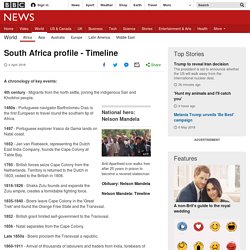

The languages of South Africa. We're not called the rainbow nation for nothing.
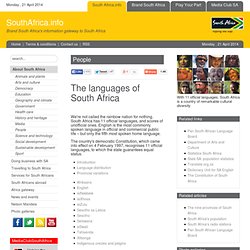
South Africa has 11 official languages, and scores of unofficial ones. English is the most commonly spoken language in official and commercial public life – but only the fifth most spoken home language. The country's democratic Constitution, which came into effect on 4 February 1997, recognises 11 official languages, to which the state guarantees equal status. Introduction Besides the 11 official languages, scores of others – African, European, Asian – are spoken in South Africa, as the country lies at the crossroads of southern Africa. Language distribution According to the 2011 census, isiZulu is the mother tongue of 22.7% of South Africa's population, followed by isiXhosa at 16%, Afrikaans at 13.5%, English at 9.6%, Setswana at 8% and Sesotho at 7.6% . * Spoken as a home language ** Unspecified and not applicable are excluded Source: Census 2001 Most South Africans are multilingual, able to speak more than one language.
Afrikaans English. What's in a (South African) name? What is the African National Congress? What is the African National Congress?
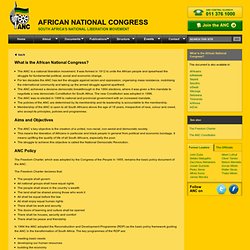
The ANC is a national liberation movement. It was formed in 1912 to unite the African people and spearhead the struggle for fundamental political, social and economic change. For ten decades the ANC has led the struggle against racism and oppression, organising mass resistance, mobilising the international community and taking up the armed struggle against apartheid.
The ANC achieved a decisive democratic breakthrough in the 1994 elections, where it was given a firm mandate to negotiate a new democratic Constitution for South Africa. The new Constitution was adopted in 1996. Aims and Objectives The ANC`s key objective is the creation of a united, non-racial, non-sexist and democratic society. ANC Policy The Freedom Charter, which was adopted by the Congress of the People in 1955, remains the basic policy document of the ANC. The World Factbook. ShowIntroduction :: SOUTH AFRICA Panel - Collapsed Dutch traders landed at the southern tip of modern day South Africa in 1652 and established a stopover point on the spice route between the Netherlands and the Far East, founding the city of Cape Town.
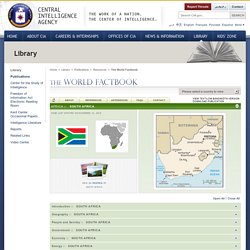
After the British seized the Cape of Good Hope area in 1806, many of the Dutch settlers (Afrikaners, called "Boers" (farmers) by the British) trekked north to found their own republics in lands taken from the indigenous black inhabitants. The discovery of diamonds (1867) and gold (1886) spurred wealth and immigration and intensified the subjugation of the native inhabitants. The Afrikaners resisted British encroachments but were defeated in the Second South African War (1899-1902); however, the British and the Afrikaners, ruled together beginning in 1910 under the Union of South Africa, which became a republic in 1961 after a whites-only referendum.
South Africa profile - overview. South Africa has one of the continent's biggest and most developed economies.
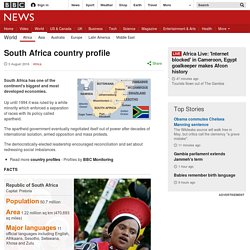
Up until 1994 it was ruled by a white minority which enforced a separation of races with its policy called apartheid. The apartheid government eventually negotiated itself out of power after decades of international isolation, armed opposition and mass protests. The democratically-elected leadership encouraged reconciliation and set about redressing social imbalances. Read more country profiles - Profiles by BBC Monitoring Population 50.7 million Area 1.22 million sq km (470,693 sq miles) Major languages 11 official languages including English, Afrikaans, Sesotho, Setswana, Xhosa and Zulu Religions Christianity, Islam, indigenous beliefs Life expectancy 53 years (men), 54 years (women) Currency Rand Getty Images President: Jacob Zuma Image copyright Getty Images.
South Africa profile - Timeline. A chronology of key events: 4th century - Migrants from the north settle, joining the indigenous San and Khoikhoi people. 1480s - Portuguese navigator Bartholomeu Dias is the first European to travel round the southern tip of Africa. 1497 - Portuguese explorer Vasco da Gama lands on Natal coast. 1652 - Jan van Riebeeck, representing the Dutch East India Company, founds the Cape Colony at Table Bay. 1795 - British forces seize Cape Colony from the Netherlands. 1816-1826 - Shaka Zulu founds and expands the Zulu empire, creates a formidable fighting force.
